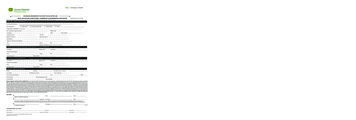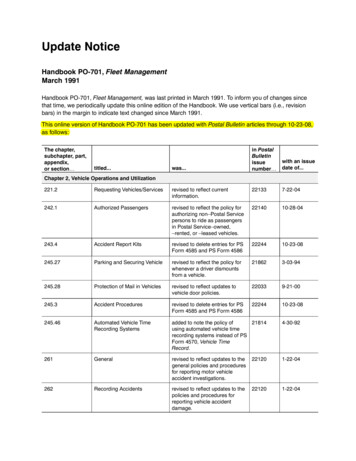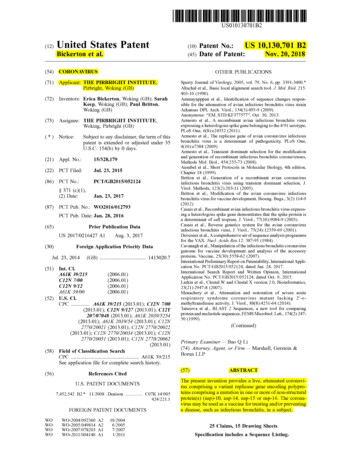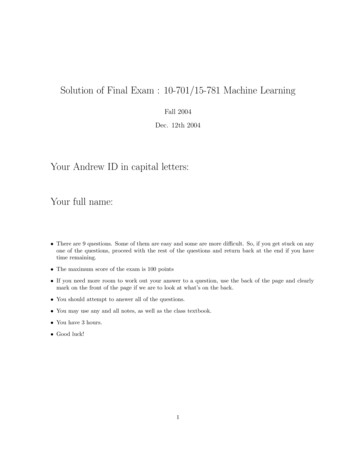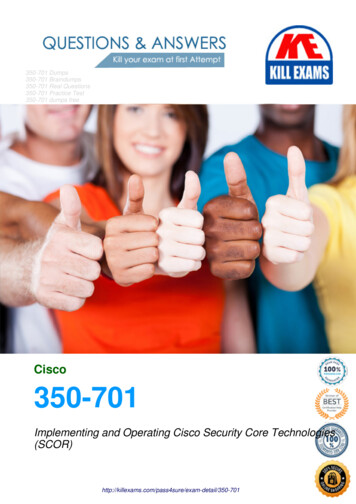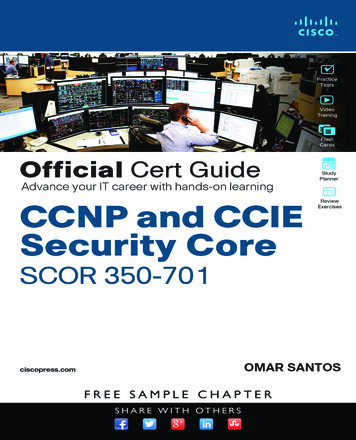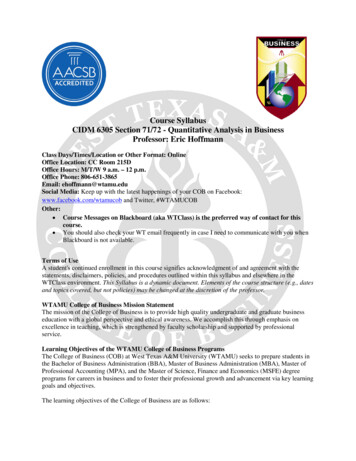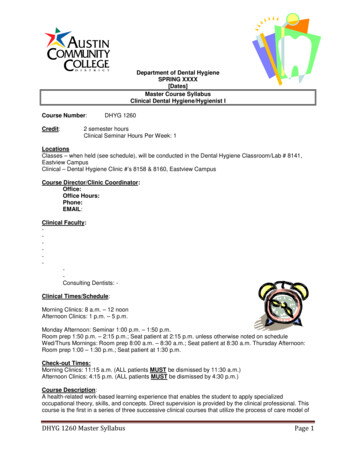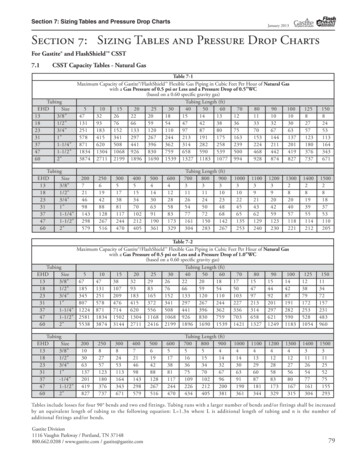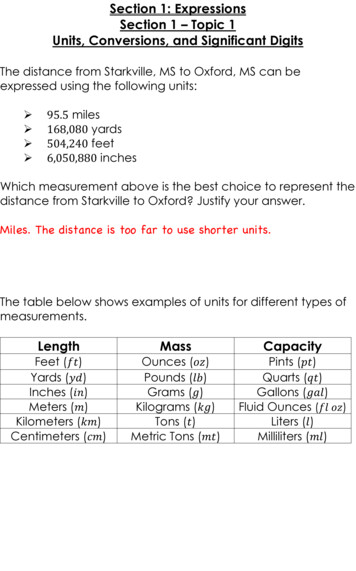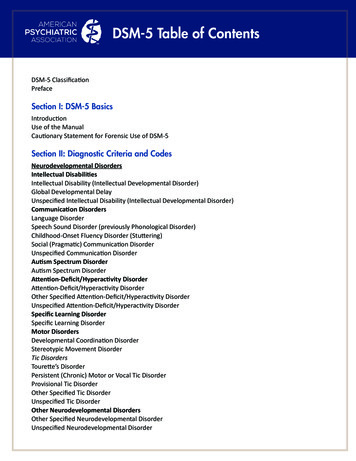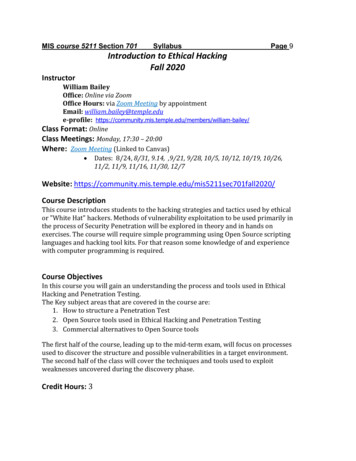
Transcription
MIS course 5211 Section 701InstructorSyllabusIntroduction to Ethical HackingFall 2020Page 9William BaileyOffice: Online via ZoomOffice Hours: via Zoom Meeting by appointmentEmail: william.bailey@temple.edue-profile: ailey/Class Format: OnlineClass Meetings: Monday, 17:30 – 20:00Where: Zoom Meeting (Linked to Canvas) Dates: 8/24, 8/31, 9.14, ,9/21, 9/28, 10/5, 10/12, 10/19, 10/26,11/2, 11/9, 11/16, 11/30, 12/7Website: 2020/Course DescriptionThis course introduces students to the hacking strategies and tactics used by ethicalor "White Hat" hackers. Methods of vulnerability exploitation to be used primarily inthe process of Security Penetration will be explored in theory and in hands onexercises. The course will require simple programming using Open Source scriptinglanguages and hacking tool kits. For that reason some knowledge of and experiencewith computer programming is required.Course ObjectivesIn this course you will gain an understanding the process and tools used in EthicalHacking and Penetration Testing.The Key subject areas that are covered in the course are:1. How to structure a Penetration Test2. Open Source tools used in Ethical Hacking and Penetration Testing3. Commercial alternatives to Open Source toolsThe first half of the course, leading up to the mid-term exam, will focus on processesused to discover the structure and possible vulnerabilities in a target environment.The second half of the class will cover the techniques and tools used to exploitweaknesses uncovered during the discovery phase.Credit Hours: 3
MIS course 5211 Section 701SyllabusPage 9Required Reading & /www.geeksforgeeks.org/layers-of-osi-model/3 ner-vulnerability-assessment-344904 sive-security.com/metasploit-unleashed/Main PageReview Fundamentals, Information Gathering, and Vulnerability ScanningRead Exploit Development, Web App Exploit Development, Client SideAttacks and Auxiliary Module :OWASP Top Ten rity.in Burp %20Suite tutorialPart Security.in Burp %20Suite tutorialPart ity.in Burp %20Suite tutorialPart 03.pdfWe will only use the functionality discussed in the first ies-web-app-039-s-security-nemesis-34247The last papers also contain information applicable to the following week.11 No reading Assignment12 ion-security-120113 No Reading Assignment14
MIS course 5211 Section 701SyllabusPage 9Schedule of Topics, Readings, Assignments with Due datesCourse Schedule**Subject to change at the discretion of the ProfessorsWeek Topic1Overview of Course, Philosophy ofEthical Hacking and PenetrationTesting, and the hacking process.2TCP/IP and Network Architecture andits impact on the process of hacking.Google Hacking3Reconnaissance – Concepts ofreconnaissance used to obtain basic,high level information about a targetorganization, often consideredinformation leakage, including but notlimited to technical and non-technicalpublic contacts, IP address ranges,document formats, and supportedsystems.4Network Mapping and ance exercise using only publiclyavailable information, develop a profile of apublic company or organization of yourchoosing.5Introduction to MetasploitQuizScanning exercise targeted against onlysystems you personally own, develop aprofile of the targeted machine ormachines.Quiz6Continued MetasploitQuiz7Social Engineering, Encoding, andEncryption and the Social EngineeringToolkitMalware including Trojans, Backdoors,Zero-days, Virus, Worms, andPolymorphic malwareExam8QuizAnalysis Report: Learnings from Metasploitrun against a publicly available VM thestudent chooses
MIS course 5211 Section 7019SyllabusPage 9Web application hacking, OWASP QuizTop 10, Intercepting Proxies, and Intercepting Proxy exercise targeted againstURL Editinga public website of your choice. Onlynormal website activity is to beprofiled. Under no circumstances shallinjection techniques be used.IntroductionQuizto SecurityShepherdIntro to Dark WebQuizIntro to CloudIntroduction to Wireless Security Quizwith WEP and WPA2 PSKWPA2 Enterprise andQuizBeyond WiFiJack the Ripper, Cain and Able, Examand Ettercap1011121314AssignmentsSee Project SectionParticipationMuch of your learning will occur as you prepare for and participate in discussions about the coursematerial. The assignments, analysis, and readings have been carefully chosen to bring the real world intoclass discussion while also illustrating fundamental concepts.To encourage participation, 20% of the course grade is earned by preparing before class and discussing thetopics between and in class. Evaluation is based on you consistently demonstrating your engagement withthe material. Assessment is based on what you contribute, not simply what you know.1. Preparation before class – To facilitate active participation in the class I request that you beprepared with the following before noon on the day of the class:2.3.4.Briefly address and summarize:a. One key point you took from each assigned reading. (One or two sentences per reading)b. One question that you would ask your fellow classmates that facilitates discussion.Each week there will be one or more Discussion Question(s) that each student will provide aninitial response to by noon on the day of class.I will also require that you identify, and are prepared to discuss, an article about a current event inthe Ethical Hacking and Penetration Testing arena each week. Each student is expected tocontribute a link to an article to the online class discussion each week. An ideal article would betied thematically to the topic of the week, however, any article you find interesting and would liketo share is welcome. The deadline for posting is noon on the day of class.Participation during class – We will typically start each session with “opening” questions aboutthe assigned readings and analyses. I may ask for volunteers, or I may call on you. Studentscalled on to answer should be able to summarize the key issues, opportunities, and challenges inthe analyses. All students should be prepared to answer these questions.Another important aspect of in-class participation is completion of in-class assignments andcontribution to any break out activities.
MIS course 5211 Section 7015.SyllabusPage 9Participation between classes – To facilitate ongoing learning of the course material, we will alsodiscuss course material on the class blog between clasess.You will post analyses to the Canvas course site.The criteria for participation includes attendance, punctuality, level of preparation, professionalism,answering questions, discussing readings, discussing case studies, contributing to group activities, andcontributing to a positive learning environment. Recognizing that students sometimes have unavoidableconflicts, the baseline for expected participation is assessed on one less week than the number of assignedweekly write-ups.ProjectYou will prepare three analyses reports that are assigned during the semester. Do not prepare a separatecover page, instead put your name, the class section number (MIS5211.701), and the analysis in the top-leftcorner of the header.To submit your analysis, you must upload to Canvas (under Assignments) no later than Sunday at 11:59PM of the day before class it is due for presentation.Late submissions for this deadline may result in no credit earned for this assignment.There is no one particular style for a good analysis. But, there are some common elements to excellentsubmissions (additional, grade-specific criteria are provided at the end of this syllabus): The opening of the analysis makes it immediately clear which assignment and what question is beingaddressed. You have cited specific details regarding key facts and issues of the case. Instead of general observationsabout information technology or organizations that apply to any problem, draw details from the assignmentitself. Analyses, observations, and suggestions should be tied directly to those key facts and issues. You canalso draw on the other readings in the course to inform and support your arguments. After analyzing the details of the analysis, discuss how its specific issues have broader application. Inother words, use your analysis to provide some advice to managerial decision-makers that can be applied toother situations beyond this case. Provide a balanced perspective. For example, when making a recommendation explain the pros and cons,providing both the rationale (the why) as well as its feasibility (the how). Well-consideredrecommendations include discussion of potential issues with your solution and conditions that should be inplace for your recommendation to be successful.ExamsWe will have 2 multiple choice question exams. The first one will cover the Introduction to EthicalHacking materials that we will address in the first 5 weeks of the semester. It represents 20% of your finalgrade. The second exam will be comprehensive. Anything that we cover during the semester could appearon the final. The second exam is weighted 20% of your final grade.QuizzesQuizzes will be assigned periodically during the course. These will be made available during the week, anddue by 11:59 PM on the day before our next class.
MIS course 5211 Section 701SyllabusPage 9Weekly CycleAs outlined above in the Assignments and Participation sections, much of your learningwill occur as you prepare for and participate in discussions about course content. Tofacilitate learning course material, we will discuss course material on the class blog inbetween classes. Each week this discussion will follow this cycle:WhenActorTaskTypeFridaySunday 11:59 pmSunday 11:59 pmMonday by 11:59amMondayMonday – Friday(during the week)InstructorStudentStudentStudentPost reading questions on Community web siteComplete Quiz for prior week (if applicable)Post Analyses Report(s) (when due) on CanvasPost initial Discussion Question ntClass meeting via ZoomPost replies to other students’ DQ responsesParticipationParticipationEvaluation and GradingItemAnalyses ReportsDiscussion Questions &ParticipationQuizzesExam 1Exam 2Weight30%(10% per report)20%10%20%20%100%Grading Scale94 – 10090 – 9387 – 8983 – 8680 – 8277 – 79AAB BBC 73 – 7670 – 7267 – 6963 – 6660 – 62Below 60CCD DDFGrading CriteriaThe following criteria are used for evaluating assignments. You can roughly translate aletter grade as the midpoint in the scale (for example, an A- equates to a 92).CriteriaGradeThe assignment consistently meets and exceeds expectations. It demonstratesoriginality of thought and creativity. Beyond completing all of the required elements,new concepts and ideas are detailed that transcend general discussions along similartopic areas. There are no mechanical, grammatical, or organization issues that detractfrom the ideas.A- or AThe assignment meets expectations. It contains information prescribed for theassignment and demonstrates understanding of the subject matter. There may be someomissions or procedural issues, such as grammar or organizational challenges, but thesedo not significantly detract from the intended assignment goals.B or B The assignment fails to consistently meet expectations. That is, the assignment iscomplete but contains significant problems that detract from the intended goals. Theseissues may be relating to content detail, be grammatical, or be a general lack of clarity.Other problems might include not fully following assignment directions.B-The assignment constantly fails to meet expectations. It is incomplete or in some otherway consistently fails to demonstrate a firm grasp of the assigned material.Below B-
MIS course 5211 Section 701SyllabusPage 9Late Assignment PolicyAn assignment is considered late if it is turned in after the assignment deadlines statedabove. No late assignments will be accepted without penalty unless arrangements forvalidated unusual or unforeseen situations have been made. The exercise assignments will be assessed a 50% penalty if they are late. No credit isgiven for late participation assignments including required posts of comments and Inthe News articles. You must submit all assignments, even if no credit is given. If you skip an assignment,an additional 10 points will be subtracted from your final grade in the course. Plan ahead and backup your work. Equipment failure is not an acceptable reason forturning in an assignment late.University PoliciesTEMPLE AND COVID-19Temple University’s motto is Perseverance Conquers, and we will meet the challenges of theCOVID pandemic with flexibility and resilience. The university has made plans for multipleeventualities. Working together as a community to deliver a meaningful learning experienceis a responsibility we all share: we’re in this together so we can be together.Attendance Protocol and Your HealthInstructors are required to ensure that attendance is recorded for each in-personor synchronous class session. The primary reason for documentation of attendance is tofacilitate contact tracing, so that if a student or instructor with whom you have had closecontact tests positive for COVID-19, the university can contact you. Recording of attendancewill also provide an opportunity for outreach from student services and/or academicsupport units to support students should they become ill. Faculty and students agree to actin good faith and work with mutual flexibility. The expectation is that students will behonest in representing class attendance.Video Recording and Sharing PolicyAny recordings permitted in this class can only be used for the student’s personaleducational use. Students are not permitted to copy, publish, or redistribute audio or videorecordings of any portion of the class session to individuals who are not students in thecourse or academic program without the express permission of the faculty member and ofany students who are recorded. Distribution without permission may be a violation ofeducational privacy law, known as FERPA as well as certain copyright laws. Any recordingsmade by the instructor or university of this course are the property of Temple University.Any unauthorized redistribution of video content is subject to review by the Dean’s office,and the University Disciplinary Committee. Penalties can include receiving an F in thecourse and possible expulsion from the university. This includes but is not limited to:assignment video submissions, faculty recorded lectures or reviews, class meetings (live orrecorded), breakout session meetings, and more.Code of Conduct Statement for Online Classes Online BehaviorStudents are expected to be respectful of one another and the instructor in onlinediscussions. The goal is to foster a safe learning environment where students feelcomfortable in discussing concepts and in applying them in class. If for any reason yourbehavior is viewed as disruptive to the class, you will be asked to leave and you will be
MIS course 5211 Section 701SyllabusPage 9marked absent from that class. Please read the university policy concerning disruptivebehavior:The disruptive student is one who persistently makes inordinate demands fortime and attention from faculty and staff, habitually interferes with the learningenvironment by disruptive verbal or behavioral expressions, verbally threatensor abuses college personnel, willfully damages college property, misuses drugsor alcohol on college premises, or physically threatens or assaults others. Theresult is the disruption of academic, administrative, social, or recreationalactivities on campus.Online Classroom EtiquetteThe expectation is that students attending online courses will behave in the same manner asif they were in a live classroom. Be courteous and professional in your location, attire andbehavior. Specifically, your location should reflect a clean and professional appearance not a bedroom, crowded conference room, loud restaurant/bar, etc. Your attire shouldmirror what you might wear to a live classroom. We expect that students will not disruptclass through visuals or verbal outbursts, such as but not limited to, conversations withother people in the room, engaging in inappropriate behavior while you are in class ordistracting the class in any other way. In addition, students should refrain from doingsomething in their online class that they would not do in a live classroom. which includeseating large meals, drinking alcohol, vaping, getting up often and leaving the online class(not staying at their computer). You should arrive on time and leave when the class is over.If there is an emergency of some kind, notify your faculty member via email or the chatfunction in Zoom.Online exam proctoringProctorio or a similar proctoring tool may be used to proctor exams or quizzes in thiscourse. These tools verify your identity and record online actions and surroundings. It isyour responsibility to have the necessary government or school issued ID, a laptop ordesktop computer with a reliable internet connection, the Google Chrome and Proctorioextension, a webcam/built-in camera and microphone, and system requirements for usingProctorio or a similar proctoring tool. Before the exam begins, the proctor may require ascan of the room in which you are taking the exam.Student and Faculty Academic Rights & ResponsibilitiesFreedom to teach and freedom to learn are inseparable facets of academic freedom.The University has a policy on Student and Faculty Academic Rights and Responsibilities(Policy #03.70.02) which can be accessed at policies.temple.edu.Inclement Weather PolicyPlease be advised that while Temple University campuses may close for inclement weather,online courses are not on-campus and therefore are still expected to meet. Your instructorwill contact you regarding any adjustments needed in the event of a power outage or severecircumstances. Should you have any questions, please contact the professor.Academic HonestyLearning is both an individual and a cooperative undertaking. Asking for and giving helpfreely in all appropriate setting helps you to learn. You should represent only your own
MIS course 5211 Section 701SyllabusPage 9work as your own. Personal integrity is the basis for intellectual and academic integrity.Academic integrity is the basis for academic freedom and the University's position ofinfluence and trust in our society. University and school rules and standards define andprohibit "academic misconduct" by all members of the academic community includingstudents. You are asked and expected to be familiar with these standards and to abide bythem. A link to Temple’s Policy on Academic Dishonesty can be found at the following oceduresDisability StatementAny student who has a need for accommodations based on t
Ethical Hacking and Penetration Testing, and the hacking process. 2 TCP/IP and Network Architecture and its impact on the process of hacking. Google Hacking Quiz 3 Reconnaissance – Concepts of reconnaissance used to obtain basic, high level information about a target organization

